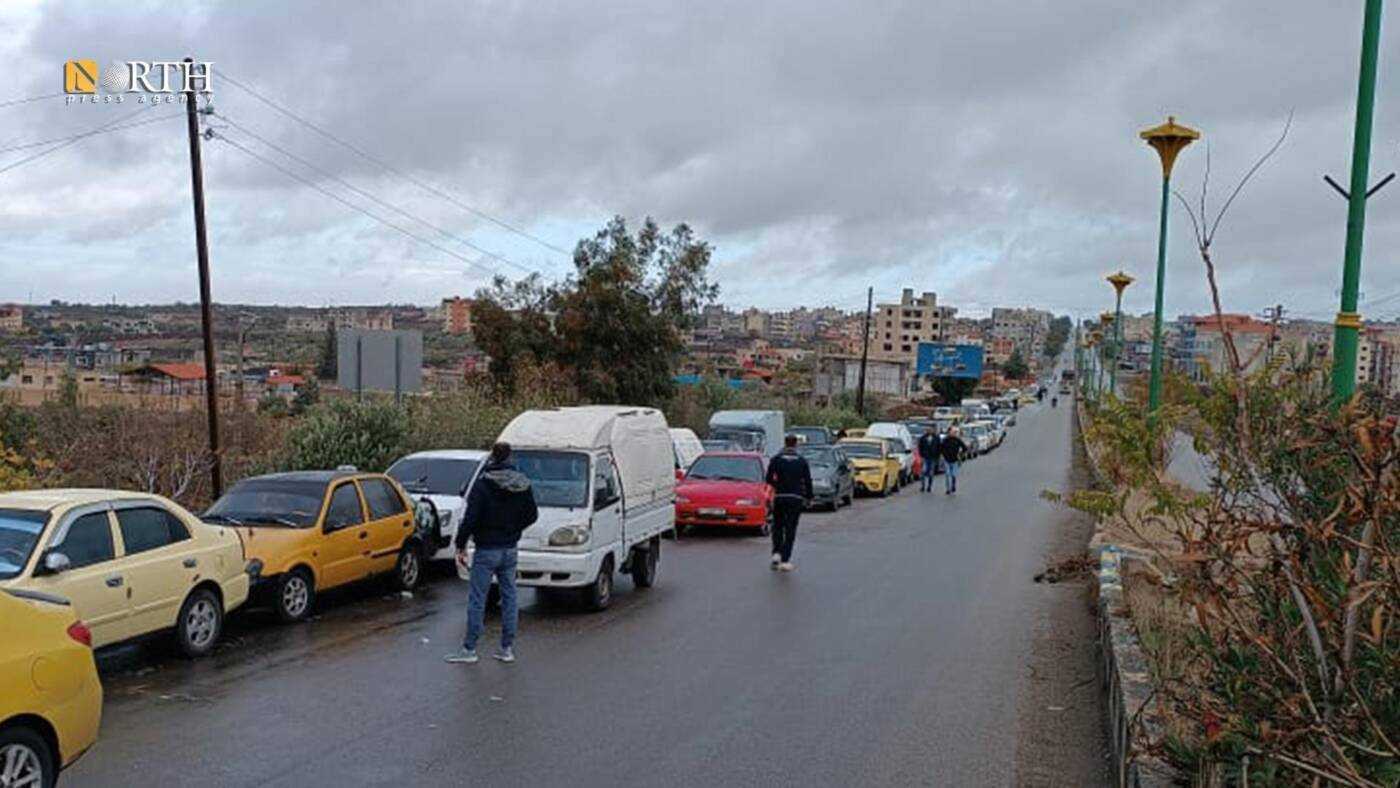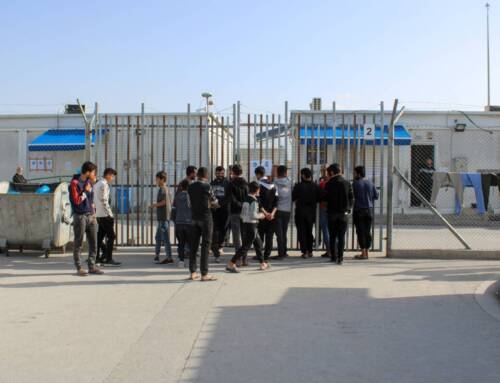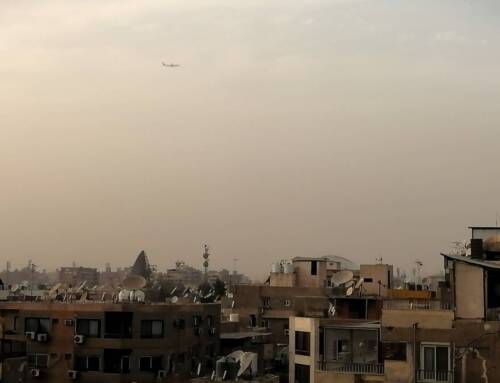Fuel crisis in regime areas pushes Syrians to the brink, paralyzes public sector
Regime-controlled parts of Syria are in the grips of the worst fuel crisis since 2011, driving up costs of heating, goods and services, and paralyzing parts of the public sector
5 January 2023
PARIS — Abu Muhammad’s family is relying on blankets to ward off the winter cold. So far unable to provide another means of heating—like wood—the father in the Daraa province city of Jassim worries about what al-marbaniya, the coldest days of winter, will bring.
Last winter was cruel, too. That year, Abu Muhammad barely managed to install a mazot (diesel)-fueled heater to warm his family of five, including three children—the oldest seven years old. But this winter comes as a severe fuel crisis strikes Syria. If it can be found, diesel is expensive, so the father has given up this option entirely.
Abu Muhammad is financially comfortable compared to some other residents of regime areas. He owns a mobile phone store in his city, but still cannot afford to pay to heat his home with mazot. He plans to rely on wood as the cold deepens, but its prices are going up, and “might make this solution difficult, too.”
Since mid-November, regime-controlled parts of Syria have been in the grips of their most severe fuel crisis since 2011. In response, the regime government has suspended work at some of its departments and many industrial sectors in the country, resulting in a general state of paralysis.
Mazot: ‘Burning money’
Facing the ongoing fuel crisis, Damascus’ Ministry of Internal Trade and Consumer Protection raised the price of 95-octane gasoline for the second time in less than a month on Tuesday. The new price per liter stands at SYP 5,750 ($0.91 according to the current parallel market exchange rate of SYP 6,300 to the dollar), up from SYP 5,300 ($0.84).
Following the decision, Prime Minister Hussein Arnous said in a statement that “recent bottlenecks in oil derivatives” are headed for “relief” due to the “frequent arrival of supplies under a defined program to better provide for demand.”
The ministry had previously raised the price of fuel on December 13, hiking the price of a liter of subsidized gasoline from SYP 2,500 ($0.39) to SYP 3,000 ($0.47) and unsubsidized gasoline from SYP 4,000 ($0.63) to ($0.77). The price of the same quantity of subsidized mazot, which is distributed by the state-run Syrian Company for the Storage and Distribution of Petroleum Products, was raised from SYP 500 ($0.07) to SYP 700 ($0.11), while the price of local mazot intended for economic activities went from SYP 2,500 ($0.39) to SYP 3,000 ($0.47).
While the price of subsidized fuel went up, fuel allocations provided by Damascus through its “smart card” system at this price are virtually nonexistent, and many people rely on the black market for fuel instead. But the crisis has hit black market fuel prices, too.
In Syria’s southern Daraa province, the price of a liter of gasoline has reached SYP 14,000 ($2.20), while diesel sells for SYP 11,000 ($1.70). A canister of natural gas, meanwhile, costs SYP 150,000 ($23.80). In the capital, Damascus, a liter of black market gasoline is even more expensive: SYP 20,000 ($310). The same amount of mazot costs SYP 16,000 ($2.50).
As people flock to wood as an alternative to fuel, its cost has also risen. In December, the price of a kilogram went from SYP 975 ($0.15) to SYP 1,500 ($0.23).
Until Abu Muhammad can provide firewood for his own house, he is splitting the cost of firewood with his father and brothers to heat the family home next door. There, the fire is lit from 6pm until midnight, and consumes around 10 kilograms of wood a day, costing SYP 15,000 ($2.30).
In Inkhil, another city in the Daraa countryside, Abu Samer’s family has not used mazot for heating since the winter of 2020. Today, they use wood, plastic and cardboard for their fire, as well as jalla, sun-dried animal dung burned for heating. Before 2011, the family consumed three barrels of mazot in the winter.
“Mazot is available in the black market, and a 159-liter barrel costs around SYP 2 million [$317,” Abu Samer said. He sees using a mazot heater these days as “burning money.”
The average monthly cost of living for a family of five in Syria stands at more than SYP 3.5 million ($555), with the minimum cost of living at SYP 2.23 million ($353), according to the Kassioun newspaper affiliated with the People’s Will Party led by former Deputy Prime Minister for Economic Affairs Qadri Jamil, who currently lives in Russia.
In contrast, the average salary of a public sector employee in Syria is around SYP 100,000 ($16.50) per month. Some 40 percent of Syrian families rely on remittances sent by relatives who are refugees or expatriates abroad, according to the Damascus government’s former Minister of Economy, Lamia Assi.
Crisis hits prices
With fuel scarce and expensive, the prices of goods and services have shot up, some by around 30 percent. The situation has also produced a crisis in shipping and transportation between Syrian provinces, which is largely paralyzed amid unprecedented high costs.
For example, the fuel crisis has caused a significant shortage in baby formula at pharmacies, and negatively impacted the transportation of medicine, the manager of a pharmaceutical warehouse told the pro-regime Athr Press website in mid-December. He noted that the cost of transporting medicine from Damascus to Hama went from SYP 700,000 ($111) at the start of December to SYP 2.5 million ($396) by the middle of the month.
The same source told Athr Press that workers in the pharmaceutical field have only two options due to the crisis: “either raise the price of medicine, or stop working.”
The head of the Syrian Federation of International Freight Forwarders (SFIFF), Saleh Kaishour, said in early December that transportation fees between Syrian provinces were up by around 70 percent or more. The cost of transporting a single truck from the port of Latakia to Damascus by road stood at around SYP 2 million ($317), he said.
The high cost of transporting goods had a clear impact on markets in the capital Damascus. There, commercial traffic at the end of December was at a standstill, “except for some weak movement in some major markets,” a journalist in the city told Syria Direct, asking not to be named for security reasons.
During the same period, at a time when transportation should be active coinciding with end-of-the-year holidays and vacations, “transport between Syrian provinces has almost stopped, due to the insanely high prices,” the journalist added.
Amid the crisis, Syrians are prioritizing their needs in terms of securing food and available means of heating, doing away with items that were once basic, but today are seen as luxuries.
Buying a mobile phone or related accessories, for example, is out of mind for many, said Abu Muhammad. His business selling mobile phones declined notably since winter began. Today, he sells three or four phones a week, compared to 14 a week during the summer months.
But the crisis has most impacted professions that rely directly on fuel or electricity provided by fuel-powered generators, Abu Samer said. He owns a sewing workshop in Inkhil, and emphasized the high cost of fabric and foam in December, not to mention the price of getting goods delivered to his workshop and sent to customers after detailing.
Abu Samer imports fabric from factories in regime-controlled Aleppo, in northwestern Syria. With “the raised price of industrial mazot, factory owners complain about the fuel shortage and its impact on their work,” he said. “My fabric order from one Aleppo factory was delayed for 20 days because of fuel.” High fuel prices hit suppliers and producers, but also “citizens impacted by increased prices,” he added.
Due to several years of fuel crises and their repercussions for electricity, in 2021 Abu Samer converted his workshop to solar energy. “The average electricity connection is up to half an hour in exchange for five hours of cuts,” he said.
But solar panels are less effective in the winter, as they rely on sunlight, and he supplements them with a fuel-powered generator. In December, with “running the generator very expensive,” Abu Samer tried not to use it. He made an exception twice, because he had an urgent order, and took on the “loss” in order to avoid falling out with his customer, he said.
A paralyzed government
After raising fuel prices in mid-December, Prime Minister Arnous said his government faced two options: either not have oil derivatives in the market, or increase the prices in a “minor” way to provide them. “Without a decision to raise the price, we will definitely reach the stage of inability,” he said, denying the state was rationing the distribution of oil products to drive up their price.
Arnous stressed the impact of raising fuel prices on the prices of local products is “very minor, and within the acceptable bounds for the general conditions.” He promised Syrians “breakthroughs and improvements in the reality of oil derivatives” within a month.
While Arnous downplayed the impact of the crisis, it “disrupted the normal work of government institutions, as well as many private institutions, means of transport, schools and universities,” the Damascus-based journalist said.
The current crisis is different from those before, he added, “more severe, and it struck the public sector and drove up the price of fuel and basic materials.” The price of one kilogram of sugar rose from SYP 4,000 ($0.63) to SYP 6,000 ($0.95), while that of one liter of vegetable oil went from SYP 14,000 ($2.22) to SYP 17,000 ($2.69).
The government did not issue a decision to suspend schools, but in effect they are “closed” because teachers cannot travel to them, the journalist and several other sources told Syria Direct.
The Council of Ministers, headed by Arnous, did announce a week-long public holiday for the public sector and public schools from December 25 to January 1, 2023. The council had previously announced a public sector holiday on both December 11 and December 18, due to “conditions in the oil market because of the blockade and unfair economic sanctions imposed on the country, and because of the conditions that delayed the arrival of oil supplies and derivatives.”
But even before the end-of-year holiday set by the Damascus government, most government institutions were already working at a minimum, with some schools and universities closed, the Damascus journalist said. “The government allowed employees to be absent, provided the work continues at a minimum [level], without officially announcing that.”
Contrary to promises made by Arnous, relief from the crisis does not appear to be on the horizon. Rather, the fallout may worsen for Syrians, since “the government has completely abandoned fuel subsidies, and is trying to put the entire burden on the people, in exchange for private companies entering the fuel provision sector and selling it at the global market price,” the journalist said.
Joseph Daher, a political economy researcher at Lausanne University in Switzerland, noted that because Syria relies primarily on oil imports, especially from Iran, “any import problem plunges the country into crises.” This leaves Syria more vulnerable to “fuel inflation, because most of it is imported,” he told Syria Direct.
Just as “sanctions contribute to import problems,” government policies and corruption “deepen the crisis of fuel access to Syria,” Daher said. He stressed that the problem is “structural,” meaning that “there are not even short-term solutions to resolve the fuel shortage problem in the market.”
Qaterjis rise amid crisis
On December 5, the regime’s Ministry of Internal Trade and Consumer Protection issued a decision allowing what it described as “companies supplying oil derivatives” to sell gasoline and diesel for economic activities at a price of SYP 5,400 ($0.85) per liter for mazot and SYP 4,900 ($0.77) for gasoline.
The ministry did not name specific companies, but local media and researchers have said the company concerned is likely Lebanon-based BS Company for Oil Services, part of the Qaterji International Group owned by the Qaterji brothers, Hussam and Muhammad, businessmen close to the regime.
BS Company imports crude oil and refines it at the Homs and Baniyas refineries, in exchange for fees paid to the Damascus government, then offers oil derivatives in the local market. The company has been on the US sanctions list since mid-2019 for its activity in facilitating the Syrian regime’s access to Iranian oil.
Following the Ministry of Internal Trade’s decision, BS Company posted the names of six fuel stations in six different provinces on its official Facebook page that it said were “opening” to sell fuel “at cost.”
The Syrian regime’s decision to raise fuel prices to an extent similar to “lifting government subsidies” while providing an opportunity for private companies is “a continuation of austerity policies,” Daher said, “and a form of economic liberalization, which the Syrian regime uses, by granting a private company the right to distribute fuel instead of the state.”
This kind of economic liberalization “benefits regime-linked businessmen first and foremost—in this case Qaterji,” Daher said. But such policies also “impact the majority of the population, meaning an increase in the cost of living and production.”
In Inkhil, the current fuel crisis looks like a struggle to stay warm and maintain basic services. In late December, the local council was “asking people to donate money,” Abu Samer said, “to provide fuel to operate a garbage truck.”
**
This report was originally published in Arabic and translated into English by Mateo Nelson.







